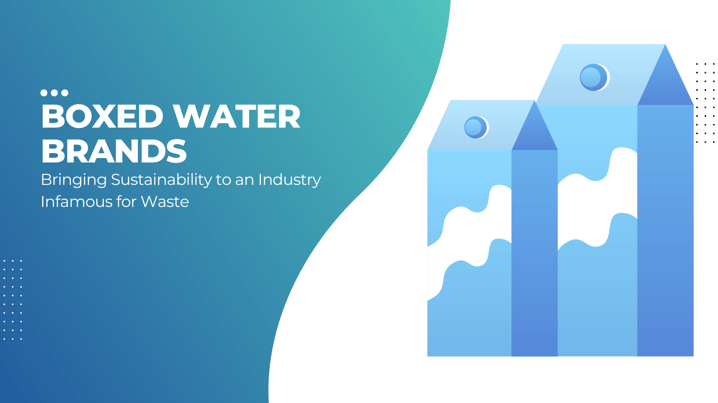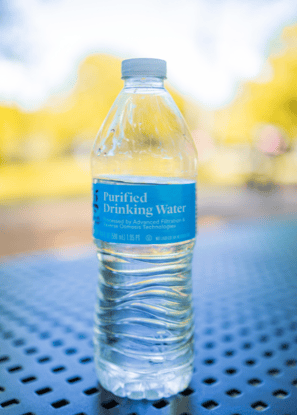3 Boxed Water Brands Bringing Sustainability to a Wasteful Industry

You’d be hard-pressed to find a consumer packaged good more ignominious than plastic water bottles. Often viewed as an unnecessary extravagance, bottled water has been at the top of the heap when it comes to the public’s perception of wasteful consumption.
The truth is, though, that portable, potable water is more than just a modern indulgence. There are communities all over the world that rely on bottled water for drinking. So, getting rid of bottled water isn’t the answer, but it’s an industry well past due for an overhaul.
That’s where boxed water comes in. Here, we’ll discuss the impact of plastic bottles on the planet, the difference between bottled water and boxed, and then take a look at some of the boxed water brands that have brought more sustainable drinking water to market.
Plastic Water Bottles and the Environment
Americans go through 50 billion single-use plastic water bottles annually, less than a third of which are recycled. That means tens of billions of bottles are deposited in landfills or end up in waterways.
Each of those bottles remains in the environment for 400-1000 years. During this time, they will break up into smaller and smaller pieces, eventually becoming microplastics—tiny particles of plastic that make their way into our water, food, and bodies, where they can cause long-term damage.

It’s not just the plastic waste that’s a problem, it’s also the resources that go into producing it.
- Extracting, pumping, transporting, and refining the crude oil used to make plastics is responsible for up to 0.86 gigatons of greenhouse gas emissions annually—or the equivalent of 189 coal plants running at full capacity.
- It takes up to 2,000x more energy to produce a bottle of water versus obtaining that same amount of water from the tap.
- It also takes about 1.4 gallons of water to produce a single 12 oz plastic bottle (not including the water inside of the bottle itself).
Simply put, our relationship with the plastic water bottle is untenable. Fortunately, a handful of industrious new brands are looking to change the consumer packaged water industry by switching from bottles to cartons.
How Water Boxes Work
Water cartons are made using a paper base and then reinforced with a small amount of plastic and aluminum (for taste, structural, and safety reasons).
The materials used in water cartons are 100% recyclable and almost entirely renewable, which exacts a far smaller cost on the Earth and its resources.
One brand, Flow, claims that its paper-based packaging has a carbon footprint 4x smaller than plastic, 5x smaller than aluminum, and 8.5x smaller than glass.
Each of the boxed water brands we analyzed used at least some plant-based plastic in the creation of their packaging. Plant-based plastics are similar to petroleum-based plastics in terms of their utility and recyclability but are made from renewable materials and emit less greenhouse gas to produce.
While water cartons aren’t new—the oldest brand in our last has been around since 2009—they are gaining in popularity. As public awareness around plastic pollution, greenhouse gases, and climate change grows, so does the demand for sustainable packaging options.
Boxed Water Brands to Look Out For
There are three top boxed water brands leading the shift from plastic water bottles to paper cartons. Read on to learn more about each company and what makes them stand apart!

Flow Alkaline Spring Water
The founder of this company, Nicholas Reichenbach, was inspired to launch a brand of packaged water (sans plastic bottles) when he was leaving Burning Man in 2015 and was shocked by the amount of discarded plastic bottles.
The spring water inside each Flow container is sourced from a single artesian well in Virginia. Artesian wells are the product of excess groundwater from rainfall. As the water surges up through the ground, it’s filtered by layers and layers of rock, which mineralizes it, giving the water a unique flavor as well as a naturally alkaline pH.
Flow offers regular spring water, as well as a number of flavored options, including Strawberry Rose, Cucumber Mint, Watermelon Lime, among others. They also have a line of collagen and vitamin-infused waters for those looking to add even more health benefits to their hydration.
JUST Water
This brand was founded in 2015 by Jaden Smith, the celebrated activist son of Will and Jada Pinkett Smith. Smith was moved to start JUST Water when he noticed a plastic water bottle floating next to him during a surfing lesson. He was unable to push the image from his mind and decided to do something about it.
JUST’s alkaline spring water is also naturally fed from two different mountain sources, one in New York for still water and another in Montana for sparkling. Both sources are consistently fed with rain and snowfall, producing millions of gallons of excess supply.
JUST offers cartons of regular spring water and varieties infused with natural flavor essences. On top of its line of boxed water, you can also look for JUST Bubbles, a sparkling option sold in aluminum bottles and several flavor options.
Boxed Water
Founded in 2009, this brand is the oldest on our list and, therefore, the first to begin selling water packaged in paper-based cartons. Boxed Wate found its footing in trendy stores like Ace Hotel and American Apparel and still enjoys its status as one of the hippest water brands on the market.
Unlike the other two companies, Boxed Water is sourced municipally. Consumers west of the Missippi River are purchasing purified water from the Wasatch National Forest. East of the Mississippi, they’re buying water sourced from Lake Michigan.
Boxed Water sells various sizes of their plain water cartons, as well as four naturally-flavored varieties.
Food Distributors Using Tech to Fight Waste
As the leading distributor of mission-driven food and beverage brands, Buffalo Market values companies like those above that are doing their part to reduce waste.
Reducing waste is at the core of what Buffalo Market stands for. That’s why we use our proprietary tech to plot efficient routes for our trucks, saving time on the road and the associated greenhouse gas emissions. We also use AI to accurately forecast sales and manage inventory at the store level, keeping shelves appropriately stocked without contributing to the growing epidemic of food waste.
If you’d like to learn more about how Buffalo Market’s faster, smarter method of food distribution can help your CPG or retail business cut down on waste, get in touch with one of our experts today.



